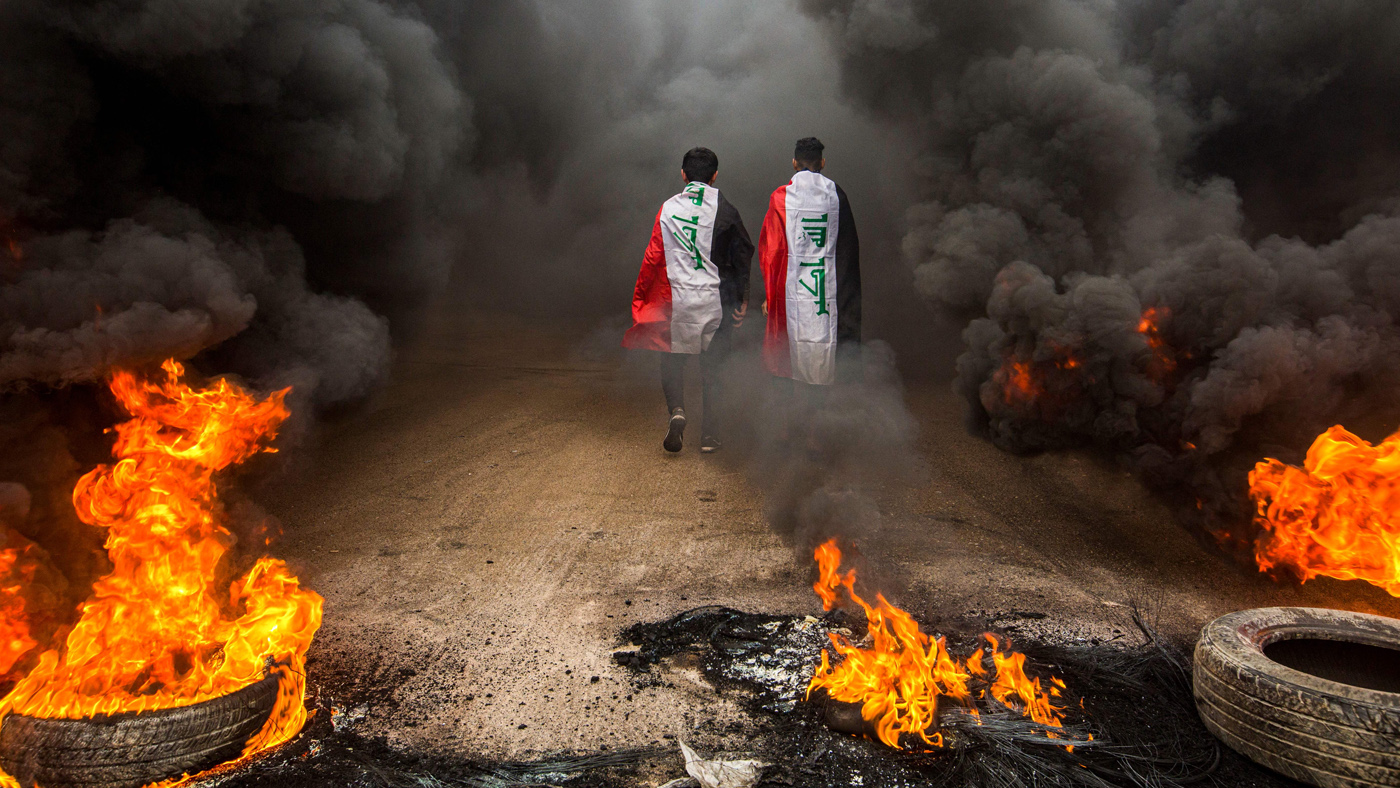Anger as security services shoot dead 45 in Iraq
Latest killings come as protesters storm and torch Iranian consulate

A free daily email with the biggest news stories of the day – and the best features from TheWeek.com
You are now subscribed
Your newsletter sign-up was successful
Security services in Iraq have shot dead at least 45 people as protesters continued to take to the streets to demand more jobs, an end to corruption and better public services.
On what the BBC describes as “one of the bloodiest days since anti-government protests began last month,” at least 25 people died when security forces opened fire to clear bridges in the southern city of Nasiriya.
Four more protesters died in Baghdad and 10 in the city of Najaf, where demonstrators stormed and torched the Iranian consulate. The Guardian says that development could “mark a turning point in the uprising against the Tehran-backed authorities”.
The Week
Escape your echo chamber. Get the facts behind the news, plus analysis from multiple perspectives.

Sign up for The Week's Free Newsletters
From our morning news briefing to a weekly Good News Newsletter, get the best of The Week delivered directly to your inbox.
From our morning news briefing to a weekly Good News Newsletter, get the best of The Week delivered directly to your inbox.
Tehran has called on Iraqi authorities to respond “firmly and effectively” to protesters who attacked the consulate. Iran's Foreign Ministry spokesman Abbas Mousavi expressed “hatred” for the protesters and demanded action.
There has been widespread outrage over yesterday’s killings. Amnesty International's Middle East research director, Lynn Maalouf, said these scenes “more closely resemble a war zone than city streets and bridges”, accusing security forces of “appalling violence against largely peaceful protesters”.
The protests began in October when Iraqis became angered by Prime Minister Adel Abdul Mahdi’s failure to tackle high unemployment, rampant corruption and poor public services.
One demonstrator said he and his fellow protesters see injustice and corruption everywhere in Iraq. “Everything is personal here,” he explained.
A free daily email with the biggest news stories of the day – and the best features from TheWeek.com
At least 350 people have been killed and thousands wounded since the unrest began. CNN says that the scale of the protests, believed to be the biggest since the fall of former President Saddam Hussein in 2003, have taken the government by surprise.
In response to the continuing disorder, the Iraqi military has announced it is setting up military “crisis cells” to quell unrest. The military command said an emergency unit had been created to “impose security and restore order”.
–––––––––––––––––––––––––––––––For a round-up of the most important stories from around the world - and a concise, refreshing and balanced take on the week’s news agenda - try The Week magazine. Start your trial subscription today –––––––––––––––––––––––––––––––
-
 Key Bangladesh election returns old guard to power
Key Bangladesh election returns old guard to powerSpeed Read The Bangladesh Nationalist Party claimed a decisive victory
-
 Judge blocks Hegseth from punishing Kelly over video
Judge blocks Hegseth from punishing Kelly over videoSpeed Read Defense Secretary Pete Hegseth pushed for the senator to be demoted over a video in which he reminds military officials they should refuse illegal orders
-
 Trump’s EPA kills legal basis for federal climate policy
Trump’s EPA kills legal basis for federal climate policySpeed Read The government’s authority to regulate several planet-warming pollutants has been repealed
-
 Epstein files topple law CEO, roil UK government
Epstein files topple law CEO, roil UK governmentSpeed Read Peter Mandelson, Britain’s former ambassador to the US, is caught up in the scandal
-
 Iran and US prepare to meet after skirmishes
Iran and US prepare to meet after skirmishesSpeed Read The incident comes amid heightened tensions in the Middle East
-
 Israel retrieves final hostage’s body from Gaza
Israel retrieves final hostage’s body from GazaSpeed Read The 24-year-old police officer was killed during the initial Hamas attack
-
 China’s Xi targets top general in growing purge
China’s Xi targets top general in growing purgeSpeed Read Zhang Youxia is being investigated over ‘grave violations’ of the law
-
 Panama and Canada are negotiating over a crucial copper mine
Panama and Canada are negotiating over a crucial copper mineIn the Spotlight Panama is set to make a final decision on the mine this summer
-
 Why Greenland’s natural resources are nearly impossible to mine
Why Greenland’s natural resources are nearly impossible to mineThe Explainer The country’s natural landscape makes the task extremely difficult
-
 Iran cuts internet as protests escalate
Iran cuts internet as protests escalateSpeed Reada Government buildings across the country have been set on fire
-
 US nabs ‘shadow’ tanker claimed by Russia
US nabs ‘shadow’ tanker claimed by RussiaSpeed Read The ship was one of two vessels seized by the US military